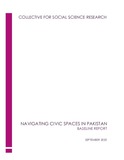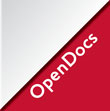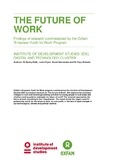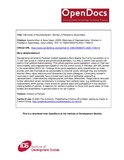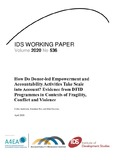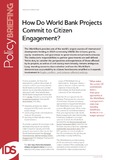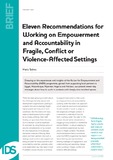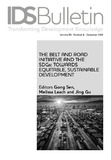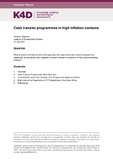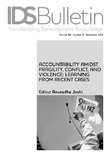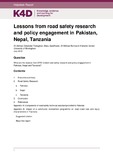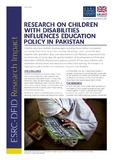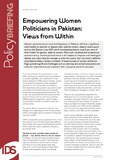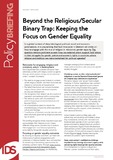Pakistan
Browse by
The Pakistan Hub aims to provide research focus in a country at the leading edge of development thinking and practice and is centered on a long-term partnership between IDS and the highly regarded Lahore University of Management Sciences (LUMS). It convenes diverse perspectives from within Pakistan and globally, bringing together researchers; civil society organisations; government institutions; communities and global actors. By encouraging collaboration, knowledge sharing, mutual learning and partnerships, it aims to strengthen development thinking and practice including policy impact and generate actionable solutions to challenges from climate change to poverty and injustice.
The hub covers a broad range of themes, spanning governance; social protection and disaster risk management; gender; agriculture, food and nutrition; education; and other broad development issues. You can also find outputs on freedom of religion or belief, related to Pakistan, in our Coalition for Religious Equality and Inclusive Development (CREID) collection.
The Pakistan Hub is part of the IDS International Initiatives that include Brazil, China, Europe, and Ghana. For more information visit the IDS website.
Collections in this community
-
Pakistan - Gender [14]
-
Pakistan - Other [11]
Recent Submissions
-
Violence and Discrimination against Women of Religious Minority Backgrounds in Pakistan
(Institute of Development Studies, 2020-11)The theme of this special collection of papers, the lived experiences of women who belong to religious minorities, has been a blind spot both in international development policy engagement and in much of the international ... -
Navigating Civic Spaces in Pakistan
(Collective for Social Science Research, 2020-09)This background paper is a review of changing civic spaces in Pakistan during the brief period from July 2018, when national elections brought a new government to power, until the first lockdowns due to the Covid-19 pandemic ... -
Winning or Buying Hearts and Minds? Cash Transfers and Political Attitudes in Pakistan
(UNU-WIDER, 2019)This paper studies how household-level receipts of cash transfers affect political attitudes in Pakistan. The paper exploits the locally exogenous eligibility cut-off of the flagship Benazir Income Support Programme to ... -
Women Politicians Navigating the ‘Hostile Environment’ in Pakistan
(Institute of Development Studies, 2020-09-21)Women in Pakistan operate within highly patriarchal contexts that promote their exclusion from public spaces; but those working in politics, the most public of spaces, defy these prevailing gender norms. This article ... -
Invisible Targets of Hatred: Socioeconomically Excluded Women from Religious Minority Backgrounds
(Institute of Development Studies, 2020-09)This paper endeavours to make visible the targeting of poor women from religious minorities in contexts where society and/or the state both engage in religious ‘otherisation’. The paper seeks to contribute to addressing ... -
The Future of Work: Findings of Research Commissioned by the Oxfam ‘Empower Youth for Work’ Program
(Oxfam Novib, 2020-07)Empower Youth for Work (EYW) is a five-year program (2016-2021) run by Oxfam, funded by the IKEA Foundation. The program focuses on enabling young people, especially young women, in climate change affected rural areas of ... -
Dilemmas of Representation: Women in Pakistan’s Assemblies
(Taylor & Francis, 2020-05-05)Recognizing constraints Pakistani women legislators face despite their entry into politics on a 17 per cent quota in national and provincial assemblies, it is time to rethink how quotas can lead to their political ... -
How Do Donor-led Empowerment and Accountability Activities Take Scale into Account? Evidence from DFID Programmes in Contexts of Fragility, Conflict and Violence
(IDS, 2020-04-03)Development donors invest significantly in governance reform, including in contexts characterised by conflict and fragility. However, there is relatively little comparative study of their change strategies, and little ... -
How Do World Bank Projects Commit to Citizen Engagement?
(IDS, 2020-03-19)The World Bank provides one of the world’s largest sources of international development funding, in 2019 committing US$62.3bn in loans, grants, equity investments, and guarantees to governments and private businesses. The ... -
Eleven Recommendations for Working on Empowerment and Accountability in Fragile, Conflict or Violence-Affected Settings
(IDS, 2020-02-11)There has been growing concern about the challenges faced by donors and development organisations working in contexts that are increasingly fragile, highly volatile and insecure. In such conditions, the first instinct of ... -
The China–Pakistan Economic Corridor: A Case Study
(Institute of Development Studies, 2019-12-17)The China–Pakistan Economic Corridor (CPEC) is a multifaceted project which was formally announced during a visit by China’s president, Xi Jinping, to Pakistan in April 2015. It is an infusion of infrastructure, energy, ... -
Cash Transfer Programmes in High Inflation Contexts
(IDS, 2019-10-31)The use of Cash Transfers (CTs) in developing regions arose as the understanding grew that some other types of aid programmes were not effectively attaining their goals. For instance, emergency food aid was responding to ... -
Debating Empowerment: Men’s Views of Women’s Access to Work in Public Spaces in Pakistan-Administered Kashmir
(Taylor and Francis, 2019-11-06)In the aftermath of the 2005 earthquake that struck Pakistan-administered Kashmir an unprecedented number of development actors arrived in the region. Their impact influenced men’s perceptions of change in the gendered ... -
Empowerment and Accountability in Difficult Settings: What Are We Learning?
(IDS, 2019)Empowerment and accountability have long been part of the international development vocabulary and a core part of governance, social development and civil society programmes. Yet, much of what has been learnt about these ... -
Empowerment without Accountability? The Lawyers’ Movement in Pakistan and its Aftershocks
(Institute of Development Studies, 2019-09-27)This case study on the Pakistan Lawyers’ Movement and its aftermath aims to add to our knowledge of judicial empowerment processes, particularly the role of lawyers in mobilising for an independent judiciary, and the ... -
Lessons from Road Safety Research and Policy Engagement in Pakistan, Nepal, Tanzania
(IDS, 2019-07)DFID invests in research on transport infrastructure to promote knowledge on cross-cutting issues, such as road safety, and to influence standards and practices across the sector. This rapid desk based study provides lessons ... -
Research on Children with Disabilities Influences Education Policy in Pakistan
(REAL Centre, University of Cambridge and The Impact Initiative, 2019-05)Children who face multiple disadvantages including those related to disability are among those least likely to be learning. Using large-scale household data together with qualitative data from classrooms in rural Pakistan, ... -
Empowering Women Politicians in Pakistan: Views from Within
(IDS, 2019-04-16)Women parliamentarians and local legislators in Pakistan still face a significant uphill battle to establish or deepen their political careers, despite recent gains such as the Election Law 2017 which mandated parties to ... -
How Does the World Bank Build Citizen Engagement Commitments into Project Design? Results from Pilot Assessments in Mozambique, Myanmar, Nigeria, and Pakistan
(IDS, 2019-04-08)How and to what degree is the World Bank putting its new institutional citizen engagement (CE) commitments into practice? This question guides an independent assessment that the Accountability Research Center (ARC) at ... -
Beyond the Religious/Secular Binary Trap: Keeping the Focus on Gender Equality
(IDS, 2019-03-19)In a global context of deep ideological, political, social and economic polarisations, it is unsurprising that fault lines exist in Western aid circles on how to engage with the role of religion in relation to gender ...


